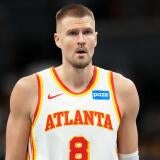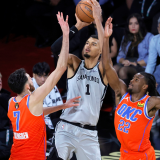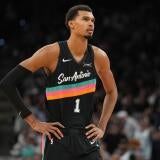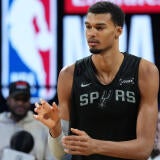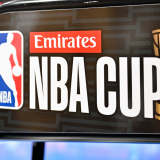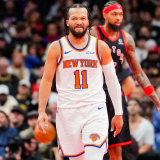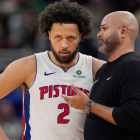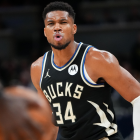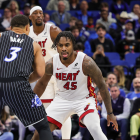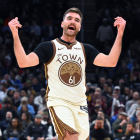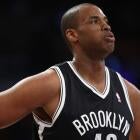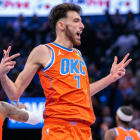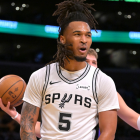
Jalen Williams just got subjected to NBA's most unfair rule because of the Thunder forward's ill-timed injury
Williams is about to lose a whole lot of money for an exceedingly stupid reason
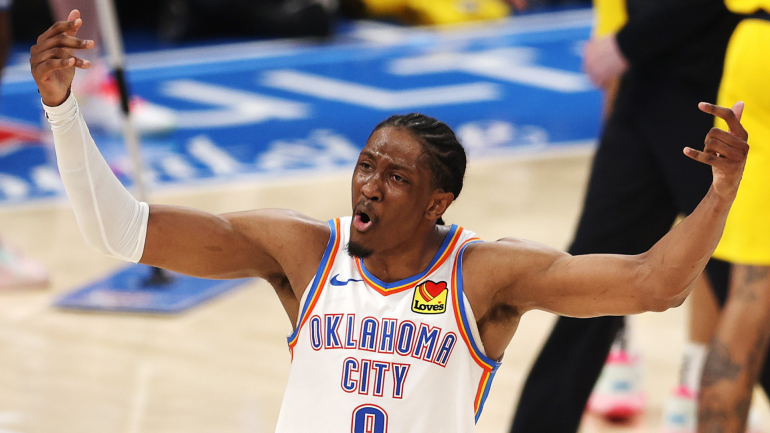
The Oklahoma City Thunder played their 18th game of the season on Sunday. Star forward Jalen Williams, recovering from offseason wrist surgery, has not participated in any of them. It's a frustrating turn of events in a recovery saga that's taken longer than anyone expected, but it will hopefully be a harmless one. Well, at least physically. While Williams is expected to make a full recovery, this unanticipated absence could cost him as much as $47 million.
How? To answer that, we need to dive into the minutia of the NBA's collective bargaining agreement. Williams just completed his third NBA season. As a former first-round pick, that meant he was eligible to sign a contract extension last offseason. Players with six or fewer years of experience are eligible to sign contracts that start at 25% of the salary cap. Sounds simple enough, right? Williams extended last offseason on a five-year deal that guarantees him a projected $240 million.
However, especially productive young players can earn more through the Derrick Rose Rule. If the player in question has made an All-NBA team or won Defensive Player of the Year either in the season before his new contract kicks in or in two of the previous three seasons, he is eligible to earn up to 30% of the cap. If a player has won MVP in any of the three previous seasons, he is also eligible. When a player isn't yet eligible for such a raise, but could potentially become eligible on future performance, that player can sign a contract that includes performance-based escalators. Evan Mobley did just that after his third season and, when he won Defensive Player of the Year in his fourth, his contract came with that bump.
Williams signed a somewhat similar contract last offseason, though the terms, according to Zach Lowe, were a bit more team-friendly. Had Williams made third-team All-NBA this season, he would have been bumped from 25% of the cap up to 26%. A second-team selection would've knocked him up to 27%, and if he'd been a first-team choice or won one of those two major awards, he would've gotten the full 30%. At that full 30%, his projected contract would have paid him around $287 million, a $47 million increase on the base amount guaranteed by his contract. However, Williams will get none of these bumps.
Why? Because he's now missed 18 games. When a player has missed 18 games in an 82-game season, the most he can play in that season would be 64 games. A few years ago, the NBA instituted a 65-game minimum for major individual honors. Assuming Williams does not play on Wednesday, he will not be eligible for MVP, Defensive Player of the Year or All-NBA. Those contractual escalators are now gone.
Now, Williams will still earn a ton of money. You can live pretty well in Oklahoma on $240 million. And his escalators weren't all-or-nothing. Many players sign rookie extensions that take them up to 30% with any All-NBA selection. But still, Williams has lost the chance to earn millions of dollars through this injury.
So why does any of this matter? Because the rule costing Williams this money is fundamentally broken. Williams can't make All-NBA this season, but he shouldn't have to. He made it last season.
The specific language of the rule, as we covered, allows for the bump if the player hit one of those benchmarks in the season before the deal kicked in or two of the previous three seasons. Williams has already proven he is an All NBA-caliber player. He just did it a year too early. If he'd spent the beginning of last season recovering from this injury but was healthy this season, he'd cash in on that bump to 26%. The order is all that matters here. He was an All-NBA player when he signed the contract, but won't be when it begins.
So why does this rule exist? The likeliest answer is that it's an extension of the Designated Veteran rule, better known as the "supermax" rule. This allows players with between seven and nine years of experience to jump from 30% of the cap to 35% of the cap. For those older players, demanding that a player has made All-NBA in the previous season makes some sense because those players are more vulnerable to age-related decline.
But players signing rookie extensions, like Williams, should be expected to continue improving, not plateau or decline. The idea in their case should be forcing them to prove that they are capable of reaching that level, not that they'll be there every year. After all, for a rookie to assure himself Rose Rule eligibility upon signing his contract, he would have to make All-NBA in both his second and third season, or 67% of his career to that point. The only player to do that since the rule was conceived is Luka Dončić. Every other Rose Rule beneficiary, aside from Rose himself who inspired it, got there thanks to their performance in their fourth season.
Part of you might be tempted to suggest that since those players earned the extra money in their fourth year, Williams should have to as well, but many of them didn't already have a third-year All-NBA selection as he did. If anything, what Williams did is more impressive. He reached that milestone early but can't benefit from it.
Aside from being unfair to Williams, this turn of events is rather unfortunate for the rest of the league. It's obviously a good problem to have, but the Thunder are about to get pretty expensive. Williams and Chet Holmgren will both start max rookie extensions next year. Shai Gilgeous-Alexander will start a supermax deal a year after that. The rest of the league would prefer it if that core was as expensive as humanly possible so that Sam Presti would have to make harder choices with the rest of his roster. Williams loses, but so do the 29 other teams trying to catch up to the Thunder.
What's especially maddening about this is that it's a one-shot deal. Williams can't earn that money back with subsequent All-NBA performances. He had one chance and he missed it. This is exactly what happened to Jayson Tatum. He made third-team All-NBA in his third season, missed All-NBA in his fourth, and then proceeded to make four straight first teams after that. Tatum was obviously worthy of the contract bump when he signed it. He proved he was worthy of it as the contract progressed. He didn't get it because he happened to have a down year in the one season that mattered. The Celtics benefitted tremendously from that unlucky sequence of events. The Thunder likely will too. But it shows just how broken this rule is.
We're unfortunately a few years away from the end of the current CBA, which includes an opt-out after the 2028-29 season, so no immediate changes are coming. When the CBA is revisited, though, this is a rule that really should be reconsidered. While players like Williams and Tatum should've gained eligibility as soon as they made their first All-NBA team, there are compromises in here that could make sense.
The easiest would be to change the timing of eligibility. Putting this much weight on any single season, especially for such young players, makes no sense. These rookie contracts, more than any other in the NBA, are designed to pay for future performance, and potential can be showcased in more seasons than just the most recent. Maybe a player who missed out on eligibility before the contract kicked in could earn eligibility in subsequent seasons by making an All-NBA team later on. Maybe the boosts could be designed to stack on top of each other, granting bigger and bigger annual raises with each All-NBA selection earned during the life of the contract.
Something should be done about this in the future, because the entire point of these bigger max contracts is to reward the very best players in the sport. Jalen Williams qualifies. Apparently, he just did so too early to get rewarded for it.


